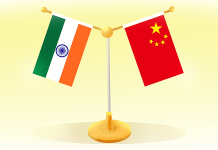India’s relationship with the United States has evolved over the years, marked by significant cooperation in various sectors such as trade, defense, and development. A recent insight from a senior adviser to Prime Minister Narendra Modi has shed light on the lesser-known role of the U.S. Agency for International Development (USAID) in shaping India’s key policies beyond the realm of electoral processes.
USAID, an independent U.S. government agency, primarily focuses on administering civilian foreign aid and development assistance. Over the decades, its influence in India has extended well beyond election-related activities, impacting numerous sectors from health and education to governance and infrastructure. In this article, we explore the various ways in which USAID has subtly shaped India’s policies, as highlighted by PM Modi’s adviser.
1. Healthcare and Public Health Policies
One of the most significant areas where USAID’s influence has been felt is in the realm of healthcare and public health. USAID has worked closely with the Indian government to strengthen health systems, especially in rural areas. The partnership has led to the successful implementation of programs aimed at combating diseases such as tuberculosis, HIV/AIDS, and malaria.
Moreover, USAID has been a key player in introducing innovative healthcare delivery models and supporting India’s ambitious health initiatives like the National Health Mission (NHM). By funding research and facilitating knowledge exchange, USAID has contributed to policy shifts toward a more inclusive and accessible healthcare system, benefitting millions of Indians.
2. Environmental Sustainability and Climate Change Initiatives
With India being one of the most vulnerable countries to the impacts of climate change, USAID has been instrumental in supporting the Indian government’s efforts toward environmental sustainability. Through various programs aimed at promoting clean energy, reducing emissions, and advancing climate resilience, USAID has directly contributed to the development of India’s environmental policies.
Notably, USAID’s collaboration with India on clean energy has helped the country diversify its energy mix, promoting solar power as a viable alternative. India’s ambitious solar energy targets, such as reaching 175 GW by 2022, have been bolstered by USAID’s technical and financial assistance, marking a key area of policy evolution influenced by the agency.
3. Agriculture and Rural Development
India’s agriculture sector is a backbone of its economy, and USAID has played a pivotal role in modernizing farming practices and improving rural livelihoods. By supporting initiatives like the Feed the Future program, which focuses on improving food security and nutrition, USAID has had a significant influence on agricultural policies in India.
The agency’s support in promoting sustainable farming techniques, enhancing water use efficiency, and introducing advanced technologies has helped India move toward a more productive and sustainable agricultural landscape. Furthermore, USAID’s work in strengthening rural infrastructure and promoting rural entrepreneurship has had a lasting impact on India’s rural development policies.
4. Education and Skill Development
Education remains a priority for the Indian government, and USAID has contributed immensely to shaping policies in this sector. By supporting skill development initiatives and promoting innovative learning approaches, USAID has influenced India’s education policies, particularly those aimed at improving access to quality education for marginalized communities.
USAID has partnered with both government and non-governmental organizations to address issues like the quality of primary education, the gender gap in education, and the need for vocational training. This partnership has resulted in the implementation of programs aimed at enhancing educational outcomes and preparing India’s youth for the future job market.
5. Governance, Transparency, and Accountability
USAID has also played a crucial role in promoting governance reforms in India. Its assistance has been particularly focused on improving transparency, accountability, and the efficiency of public services. Through various initiatives aimed at supporting the Indian government’s fight against corruption, USAID has helped foster a culture of good governance.
Additionally, the agency has provided technical support for strengthening India’s democratic institutions, such as the Election Commission, and contributed to the country’s efforts in improving the functioning of local government bodies. The result has been a more efficient and transparent policy making process, with an emphasis on citizen participation and accountability.
6. Technology and Innovation
In recent years, USAID’s support for technological innovation in India has been integral to shaping policies that focus on digital transformation and technology adoption. USAID has collaborated with the Indian government to promote digital literacy, foster the growth of startups, and enable the use of technology in governance.
The agency’s investments in sectors like digital health, e-governance, and agriculture technology have influenced India’s policy framework to be more technology-driven. By supporting initiatives like Digital India, USAID has had a hand in helping the Indian government create a policy environment conducive to technological growth and innovation.
As India continues to grow and evolve as a global player, the support and expertise provided by USAID will likely continue to influence the country’s policy landscape, making it an essential partner in India’s journey toward becoming a more sustainable, inclusive, and innovative nation.




